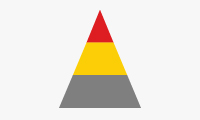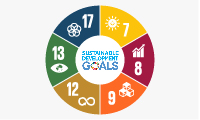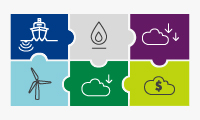Environmental and social partners
Shell collaborates with environmental and developmental organisations to bring important insights to our work to protect the environment and contribute to the well-being of communities where we operate.
Our environmental partners can bring specific expertise to our projects in areas such as biodiversity and livelihoods, while at the same time advancing their own scientific or conservation knowledge by working on our projects.
Our social partners help us tackle a range of community or human rights topics. They help us address specific priorities such as boosting local employment and improving road safety.
Environmental partners
Operating in sensitive locations
We partner with major conservation organisations to understand how to protect areas that are rich in biodiversity known as critical habitats.
Majnoon
The Majnoon marshlands form one of the world’s largest inland delta systems. In 2016, the Mesopotamian marshes north of the Majnoon field were recognised as a UNESCO World Heritage Site. In 2017, we worked with environmental organisations Flora & Fauna International, Nature Iraq and Wetlands International to bring together experts in the field to develop a biodiversity monitoring plan for Majnoon. They considered the latest techniques and technologies that could be deployed to better monitor the risks to biodiversity in the region, including using satellite imagery, radar and DNA analysis. We also worked with the International Union for Conservation of Nature (IUCN) and 30 government officials in Basrah, southern Iraq, to share best practices in protected area management.
Niger Delta
Based on recommendations from the IUCN Niger Delta panel, in 2017 Shell Petroleum Development Company of Nigeria Limited published a study on bioremediation of oil spills in Niger Delta soils. Bioremediation is a process that involves stimulating growth of microorganisms that help to degrade the pollutants. The study helped confirm the best remediation techniques to treat contaminated soil for the area in which we operate in Nigeria.
Working with the IUCN Niger Delta panel and regulators, we also developed a new framework for remediation of soil and groundwater. The framework is based on the latest science and best practice, taking into account the climate, land-use and how people live and work in the area. This framework will be tested in 2018. The collaboration has also led to a Niger Delta biodiversity strategy and a toolkit which provides guidance on restoring mangroves.
Oman
In 2017, Shell Development Oman continued to support Wetlands International’s bird survey at Barr Al Hikman wetlands, a globally significant wetland for more than 550,000 waterbirds. This initiative is helping to build scientific knowledge and understanding of the area. It supports Oman’s plans for the initiative to be recognised under the Ramsar Convention, an international treaty for the conservation and sustainable use of wetlands.
USA
In 2017, we worked with The Nature Conservancy to launch an online tool to monitor migratory species in the Gulf of Mexico and the Caribbean Sea, both areas where Shell has operations. The portal includes details on fish, sea turtles, mammals and birds to provide information on migration patterns and possible threats to the species. For more information, see the Migratory Species Conservation Programme site.
Nature-based solutions
We work with The Nature Conservancy to better understand how investing in natural climate solutions can help address the global climate challenge. This includes exploring how nature-based projects, such as large-scale reforestation, can reduce CO2 levels in the atmosphere while improving the livelihoods of local communities and preserving biodiversity and wildlife. These projects can generate carbon credits which are used to compensate for emissions elsewhere as part of a ‘biological bridge’ to a lower carbon future.
Engaging employees
We partner with Earthwatch through Project Better World, an employee volunteer scheme that enables Shell staff to make a meaningful contribution to global science and conservation. The programme also gives staff a more strategic and informed understanding of Shell’s sustainability strategy and goals.
In 2017, 50 Shell employees from 12 countries took part in Earthwatch Expeditions to South Africa, the UK and the USA, which included a learning programme to hone their sustainability leadership skills. A further 50 staff took part in other Earthwatch Expeditions to Canada and India. Over the past 19 years, the programmes have contributed around 49,000 work hours to environmental research and we welcomed the 1,000th Shell participant in 2017.
Through the Earth Skills Network programme, Earthwatch continues to help Shell build staff leadership skills by supporting them to adopt a mentoring role for IUCN or UNESCO protected areas. We have supported 51 protected areas since 2009, including six in 2017.
Partnering for conservation
Over the past 20 years, we have funded around 270 projects with our conservation partners in the USA, including the National Fish and Wildlife Foundation, to support the protection, restoration and management of habitats in the Gulf of Mexico. This approach includes using wetlands, reefs, marshes and outer island barriers to reduce coastal erosion.
In 2017, we widened our focus. We joined the Killer Whale Research and Conservation Program, a public-private partnership to help the killer whale population recover in the Pacific Northwest. The programme awards grants to projects for improving food supply and the quality and management of habitats.
External voice: "We are helping companies build natural capital into their decision-making"

Improving how businesses value, manage and account for their impacts on nature forged the first International Union for Conservation of Nature (IUCN)-Shell collaboration back in 1999. We have worked to improve Shell’s biodiversity management and environmental performance and, in return, Shell has shared valuable insights with us on IUCN’s business engagement tools.
Our collaboration is built on applying scientific evidence to improve conservation in the world of business. Together in 2017, we launched a pilot framework to help companies include natural capital in their decision-making.
IUCN and Shell don’t always see eye-to-eye and we accept that sometimes our positions may differ. But with mutual trust and respect, these differences become a strength in working through challenges. Shell’s support for IUCN-led independent, scientific and technical advisory panels, for example, has helped address contentious environmental issues in places such as the Niger Delta and the Russian Far East.
Read more about Shell’s environmental and community partners at www.shell.com/environmentalandcommunitypartners.
Social partners
Respect for Human Rights
We consult with international organisations, companies and civil society to understand and respond to current and emerging human rights issues relevant to our business. We have collaborated closely with The Danish Institute of Human Rights since 1999 to assess and improve our approach. In 2017, the institute developed an analysis to help us improve our transparency, advised us on industry benchmarking, and supported us to strengthen the application of internal metrics in some of our key areas.
Disaster relief
We partner with Mercy Corps to meet urgent needs, help people to recover from crises and build stronger futures. For example, in 2017, we donated $100,000 to Mercy Corps in response to the drought in the Lower Shabelle region of Somalia helping reach 1,950 households.
Mercy Corps’ response, with Shell's support focused on three areas:
- Food: distributing about two months of food rations to recently displaced people in the emergency camp in Baidoa and the worst affected villages of Lower Shabelle;
- Water: providing 10,000 litres of safe, drinkable water twice a week for two months for displaced families and 10,000 litres of water for both human and livestock use to households in four villages in the Lower Shabelle region; and
- Hygiene: promoting hygiene awareness for displaced people to reduce the risk of acute watery diarrhoea or cholera outbreaks.
In north-east Nigeria, with Shell’s support, Mercy Corps provided emergency humanitarian relief to 1,000 vulnerable families in Dikwa, Borno State. This response included distributing kits containing essential household items and providing people with the skills, tools and seeds needed for basic agriculture and cultivation, to help them rebuild and become more resilient to future shocks and stresses.
Dialogue with indigenous communities
In 2016, as part of our acquisition of BG, we entered into a partnership with RESOLVE, a non-profit organisation that founded the Free Prior Informed Consent (FPIC) Solutions Dialogue in 2012, and we are an active member of the FPIC Solutions Dialogue steering committee. This enables us to improve our approach to developing projects through better engagement with indigenous communities.
Developing skills and enterprises
From 2012 to 2017, we provided funding for GroFin, a finance company and long-standing partner of Shell Foundation that invests in small- and medium-sized enterprises in the Middle East and North Africa, to launch the Nomou job creation programme. Now active in Oman, Jordan, Iraq and Egypt, Nomou has invested around $46 million, helping to sustain more than 12,000 jobs, 17% of which are held by women. This programme has created around $120 million of additional economic value to date. 2017 was the last year Shell provided funding for GroFin.
In Tanzania and Kenya, we are supporting a programme called E4D/Employment and Skills for Eastern Africa with the German, British and Norwegian governments. The programme aims to improve access to jobs and economic opportunities for local people in natural resource-based industries and related sectors. By the end of 2017, the partnership raised more than 35 training programmes to industry standards and provided training for around 13,000 people. So far, 73% of the graduates have found a job.
External voice: “Helping Shell conduct business responsibly”

The Danish Institute for Human Rights was one of the first human rights organisations to work in partnership with business. Our work with Shell goes way back. They contributed to the development of our human rights compliance assessment tool, which continues to be one of the most comprehensive tools for businesses to understand how their policies, procedures and performance align with over 80 international human rights instruments.
In recent years, we worked with Shell on research that is helping further strengthen human rights implementation in the company, explore new concepts, developments and opportunities for Shell to help it conduct its business in a responsible way. This includes respecting the rights of communities.
 Sustainability at Shell
Sustainability at Shell
 Sustainable development goals
Sustainable development goals
 About our data
About our data
 Energy transition and climate change
Energy transition and climate change